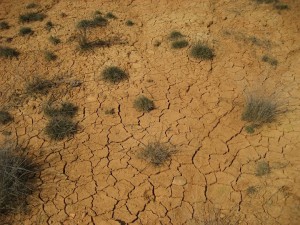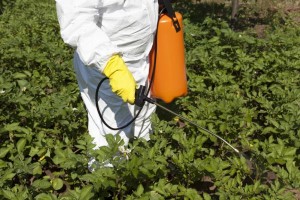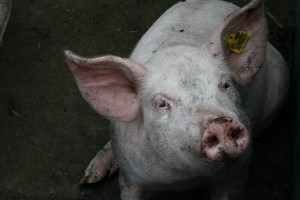Worldlog Settimana 18 – 2015
La settimana scorsa sono affogati possibilmente di nuovo 700 rifugiati in barca nel Med Dead, il mare mediterraneo che forma una barriera letale per sempre piu’ persone disperate che fuggono in europa. I partiti del governo olandese hanno avuto bisogno di piu’ di una settimana per arrivare ad un accordo sulla procedura cosidetta letto-bagno-pane, dove viene determinato che diritti hanno i rifugiati che si trovano in olanda ma non hanno il ditritto di rimanere. Come indica il nome della procedura, si tratta di bisogni basali per persone che hanno grossi bisogni di vita. Trovo imbarazzante che la discussione richieda cosi’ tanto tempo.
Stranamente la discussione politica continua a puntare sui sintomi, poiche’ togliere la causa del flusso di rifugiati sembra troppo complicato per quasi tutti i partiti. Ciononostante e’ proprio la’ che dovremo trovare la soluzione. I conflitti nascono sempre piu’ spesso dalla mancanza di cibo, un risultato da problemi di clima ed acqua. La NATO avvisa per “guerre di acqua” e i ricercatori dell’Universita’ di Colombia chiamano l’attenzione sulla guerra civile siriana – una delle cause del presente flusso di rifugiati – e’ chiarissimamente un guerra “climatica”. I conflitti vengono chiamati etnici o religiosi nell’Occidente, ma trattano nella realta’ maggiormente di acqua e cibo.
Importiamo le rose dall’Etiopia e Kenia, i fagiolini dal Marocco e da altri paesi africani che soffrono di siccita’. Importiamo il mangime dal Brasile, che si sta seccando in fretta. Ed emettendo sempre piu’ gas serra, peggioriamo solamente i problemi. Trovo assurdo lamentarsi di persone che chiedono un letto, bagno e pane, mentre noi stessi non vogliamo ammettere ch eil nostro benessere appoggia sulle spalle dei piu’ deboli, e sulle risorse fossili delle future generazioni.
A Bruxelles chiediamo un divieto europeo sul veleno agricolturale glifosfato. E’ un ingrediente del utilizzatissimo pesticide Roundup. Lo glifosfato e’ carecinogenico per l’uomo e l’animale. Questo e’ stato confermato ancora recentemente da una ricerca scientifica dell’ONU. Inoltre il veleno inquina i fiumi ed altre acque. Il prodotto Roundup viene utilizzato come pesticide dai contadini, governi e privati. A causa del grosso utilizzo, molte persone ed animali vengono in contatto con il veleno.
Una ricerca del 2013 mostra che un impressionante 63 percento degli olandesi avevano tracce di glifosfato nella loro urina! La Commissione Europea sta momentaneamente valutando se sara’ ancora ammesso l’utilizzo di glifosfato nella UE. Vengono valutati pero’ maggiormente gli studi condotti dalle medesime aziende chimiche. Abbiamo chiesto di valutare soprattutto anche della ricerca indipendente per la questione.
Gli scienziati avvisano su una nuova malattia infettiva, cioe’ l’epatite E. La carne suina e’ un’importante risorsa del virus, che e’ sempre pu’ presente. 50% dei maiali olandesi ha l’epatite E ed il 25% degli olandesi ha gia’ preso il virus. La malattia infettiva e’ simile alla BSE (Creutzfeld Jacob) oppure la febbre Q, dove si tratta sempre di una trasmissione dall’animale all’uomo. Sono soprattutto le persone deboli che possono ammalarsi severamente dalla trasmissione. Solo nell’ospedale Erasmus a Rotterdam hanno gia’ visto dieci persone morte dall’eptatite E negli ultimi tre anni. Ciononostante il nostro governo non fa niente al riguardo. E’ incredibile, no? Voglio un dibattito sull’argomento il prima possibile.
Saluti,
Marianne
Last week, some 700 boat people have drowned again in the Med Dead, the Mediterranean Sea, a lethal barrier to increasingly more people fleeing to Europe in despair. The parties in Dutch government have needed more than a week to reach agreement on the “bed-bath-bread” arrangement, which sets out the rights for asylum seekers who have exhausted all legal means and who are in our country. As the name of the arrangement suggests, these are very basic necessities of life for people who are in big trouble. I find it highly questionable and moreover shameful that this discussion has needed that much time.
Curiously, the political debate continues to focus on symptom control, because removing the breeding ground for the flow of refugees seems to be too complicated for almost all parties. But that is precisely where the solution ought to be sought. Conflicts are increasingly caused by food shortages, resulting from climate and water problems. NATO has warned for “water wars” and researchers at Columbia University have pointed out that the Syrian civil war – one of the causes for the current flow of refugees – is clearly a “climate war”. Conflicts the West often interprets as ethnic or religious are in fact mostly about water and food.
We get roses from Ethiopia and Kenya, beans from Morocco and other African countries affected by droughts. We get animal feed from Brazil, which is drying up fast. And we are only aggravating these problems by emitting more and more greenhouse gases. I find it absurd to complain about people who are asking for bed, bath and bread, while refusing to face the fact that our prosperity rests on the shoulders of the weakest and on the resources of future generations.
In Brussels, we advocate a European ban on the pesticide glyphosate, ingredient of the widely used herbicide. Glyphosate is carcinogenic to humans and animals. This was recently confirmed by scientific research of the World Health Organisation (WHO). What’s more, the poison pollutes rivers and other surface waters. Roundup is used as a weed killer by farmers, government bodies and individuals. Due to this extensive use, a lot of people and animals come in contact with the poison. Research from 2013 indicated that a whopping 63 per cent of all Dutch people had traces of glyphosate in their urine! The European Commission is currently exploring whether glyphosate should continue to be authorised for use in the EU. In this context, however, it mainly looks at studies conducted by chemical companies themselves. We have pushed to particularly look at independent research into this matter.
Experts have warned for a new infectious disease, namely Hepatitis E. Pork is a major source of the encroaching virus. 50% of pigs in the Netherlands have Hepatitis E and 25% of the Dutch population are already infected. The infectious disease is similar to BSE or Q fever, which also transfer from animals to humans. Especially weakened people may become seriously ill due to contamination. In the Rotterdam Erasmus hospital alone, 10 persons who were infected with Hepatitis E have died over the past 3 years. Still, our government has failed to intervene so far. Isn’t that astonishing? I want a debate about this as soon as possible.
Greetings,
Marianne


